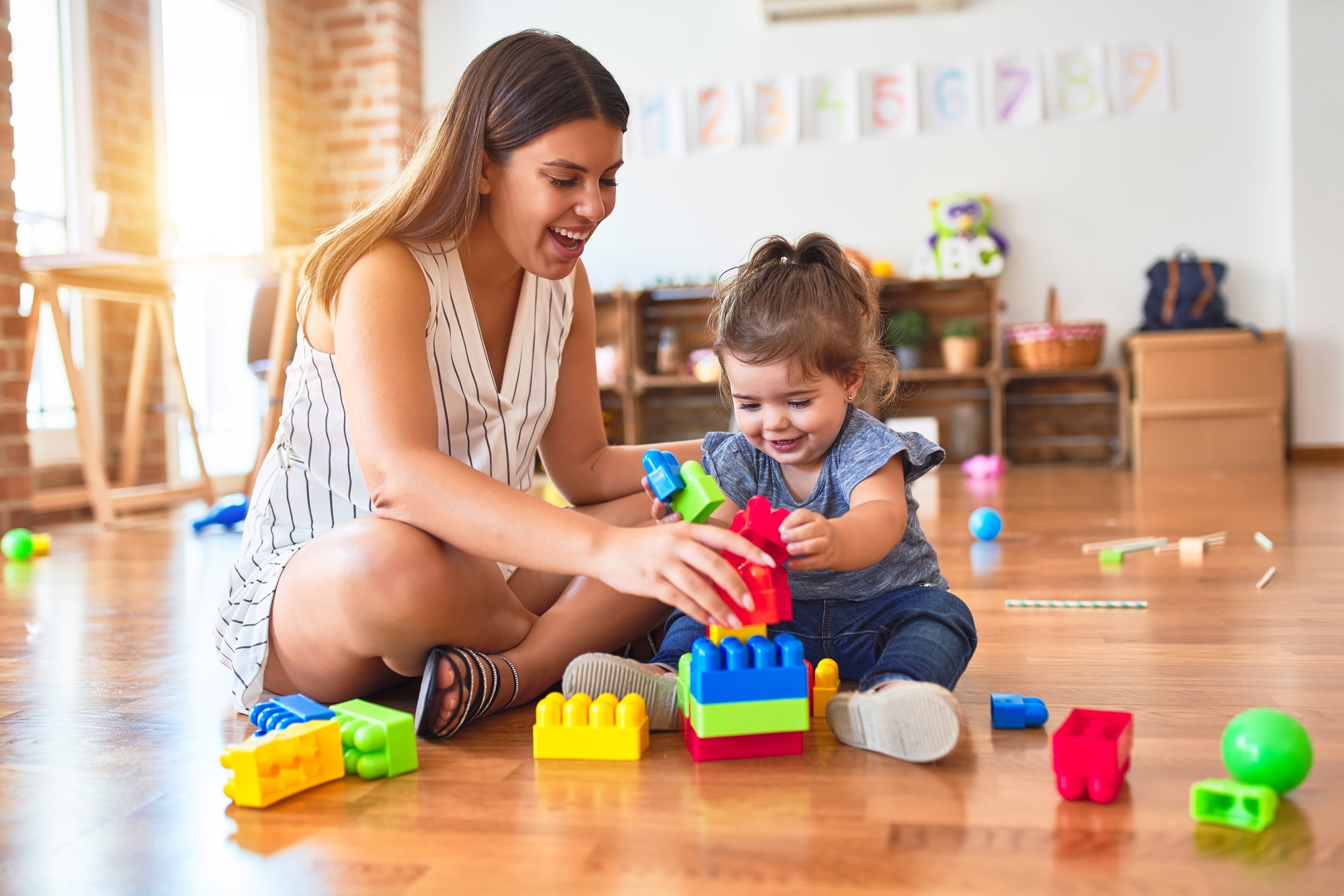Exploring Montessori Education in the Parenting Journey
Begin the Montessori education journey in parenting to nurture your child’s curiosity and independence. Dr. Maria Montessori’s holistic approach emphasizes child-led learning and creating a supportive environment for exploration. Foster independence by encouraging self-reliance and problem-solving skills. Hands-on experiences and sensory exploration enhance cognitive development. Montessori principles focus on personalized instruction, leading to academic success and holistic growth. Implementing Montessori practices at home, such as creating organized spaces and using natural elements, supports your child’s development. Discover the benefits of Montessori education by embracing its student-centered, personalized approach. Open the door to a world where your child’s potential shines.
Key Takeaways
- Implement Montessori principles at home for child’s independence.
- Use Montessori materials for sensory exploration and cognitive development.
- Foster child-led learning to promote autonomy and self-discovery.
- Establish structured routines inspired by Montessori practices.
- Engage in parent involvement to support child’s exploration and learning.
The Origins of Montessori Education

Montessori Education originated in the early 20th century, founded by Dr. Maria Montessori in Italy. Dr. Maria Montessori, an educational pioneer, developed the Montessori philosophy based on a holistic approach to education. Her methods aimed to nurture a child’s natural curiosity, independence, and love for learning.
Maria Montessori’s innovative ideas were shaped by her background in medicine and psychology, leading her to view education as a means of fostering a child’s overall development rather than just academic success. The Montessori philosophy emphasizes creating a supportive environment that encourages children to explore, discover, and learn at their own pace.
Through her observations and work with children, Maria Montessori developed a method that focuses on the individual needs of each child, promoting independence, self-discipline, and a sense of responsibility. This holistic approach to education has since been adopted worldwide and continues to influence modern educational practices.
Key Principles of Montessori Approach
When implementing the Montessori approach, the key principles focus on fostering independence, self-directed learning, and respect for each child’s individuality.
Child-led learning is at the core of the Montessori philosophy, where children are encouraged to explore and discover at their own pace. This approach values the natural curiosity and interests of each child, allowing them to take the lead in their educational journey.
Sensory exploration is another crucial component of the Montessori approach. Children are provided with hands-on materials that engage their senses, promoting learning through touch, sight, sound, and even smell.
This sensory-rich environment not only enhances cognitive development but also fosters a deeper understanding of the world around them.
Montessori Environment at Home
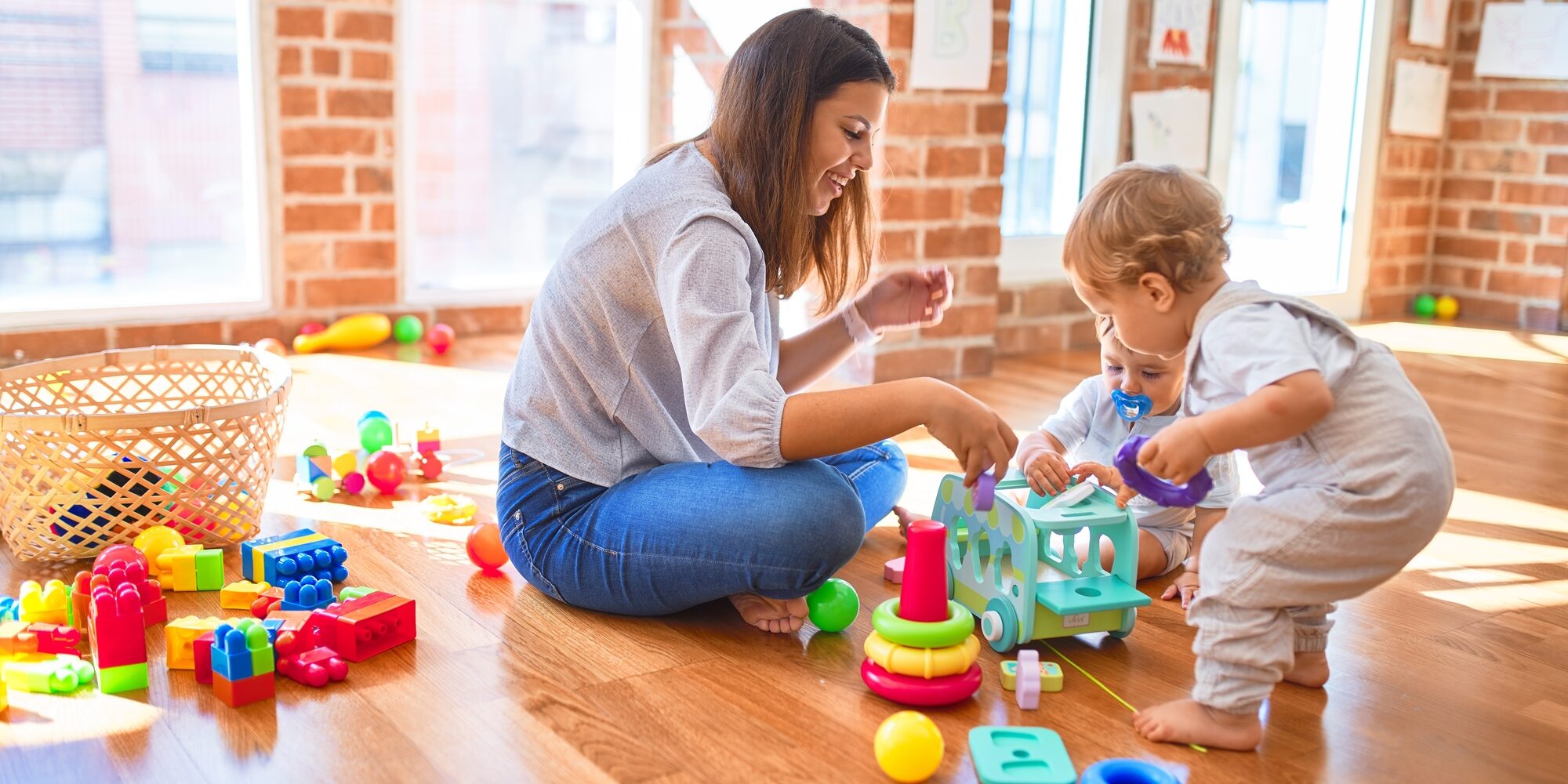
When setting up a Montessori environment at home, focus on creating spaces that are organized, inviting, and accessible to your child. Incorporate practical life activities such as pouring, transferring, and sorting to promote independence and develop fine motor skills.
Creating Montessori Spaces
To create a Montessori environment at home, consider organizing your space in a way that promotes independence and encourages exploration for your child. Design tips for setting up a Montessori space include arranging furniture and shelves at the child’s height to allow easy access to materials. Use natural light and incorporate plants to bring elements of nature indoors. Keep the space uncluttered and well-organized, providing clear boundaries for different activities.
Montessori materials play an essential role in creating an engaging environment for your child. Include items like wooden puzzles, stacking toys, and shape sorters to promote fine motor skills and cognitive development. Use open-ended toys that encourage creativity and imagination. Incorporate items such as child-sized brooms, dustpans, and watering cans to involve your child in practical tasks.
Practical Life Activities
For a Montessori environment at home, incorporating practical life activities is key to fostering independence and essential life skills for your child. These activities focus on developing practical skills and promoting independence through daily routines. By involving your child in tasks like pouring water, folding clothes, or preparing snacks, you’re providing them with valuable life skills that will aid in their independence training.
Practical life activities not only teach children how to care for themselves and their environment but also help in refining their fine and gross motor skills. These activities instill a sense of responsibility and accomplishment in children as they learn to complete tasks on their own.
Additionally, engaging in these daily routines helps children develop concentration, coordination, and a sense of order.
Encouraging Independence in Children
To cultivate independence in your child, it’s essential to promote self-reliance by encouraging them to tackle tasks on their own.
Fostering autonomy allows children to make decisions and take responsibility for their actions, building their confidence and sense of capability.
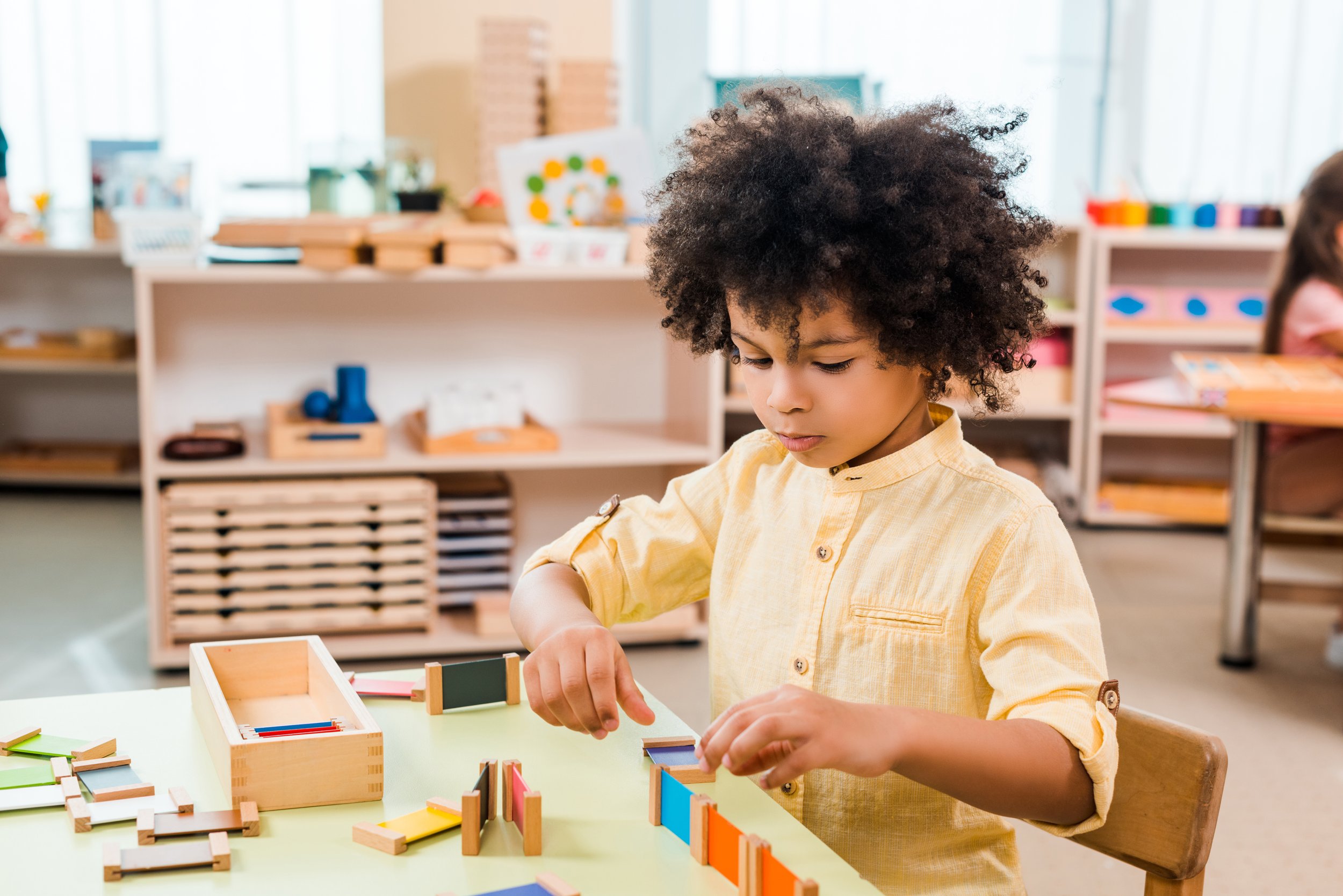
Promoting Self-Reliance in Kids
Encouraging independence in children fosters their self-reliance and nurtures their sense of autonomy and capability. By promoting self-reliance in kids, you’re actively building their confidence and developing essential life skills.
When children are encouraged to complete tasks on their own, whether it’s tying their shoes, pouring a drink, or cleaning up after themselves, they learn to rely on their abilities, leading to increased self-assurance and a sense of accomplishment.
Allowing children to take on age-appropriate responsibilities and make decisions within reasonable boundaries helps them develop a sense of ownership over their actions. This ownership fosters a belief in their capabilities and builds the foundation for self-reliance.
As parents, providing support and guidance while also giving children the space to try things independently empowers them to navigate challenges and problem-solve on their own. Ultimately, promoting self-reliance equips children with the tools they need to thrive and succeed in various aspects of their lives.
Fostering Autonomy in Children
Promoting autonomy in children involves empowering them to make decisions within appropriate boundaries, nurturing their sense of independence and self-reliance. Building confidence in children is vital for fostering autonomy. By encouraging them to take on tasks independently and praising their efforts, you help instill a sense of self-assurance that’s essential for autonomy.
Additionally, enhancing decision-making skills is a key aspect of fostering autonomy. Allow children to make age-appropriate choices throughout their day, such as selecting their clothes or choosing activities, to help them develop this essential skill.
Supporting autonomy in children is about striking a balance between providing guidance and allowing space for independence. Offer opportunities for children to explore their interests and take on responsibilities, gradually increasing the complexity as they grow. By nurturing autonomy, you’re equipping children with the tools they need to navigate the world with confidence and independence.
Nurturing Independence Skills
Nurturing independence skills in children involves fostering their ability to make decisions and take on tasks autonomously, laying the foundation for self-reliance and confidence. Developing self-care and problem-solving skills is essential in this process. Encouraging children to dress themselves, brush their teeth, and tidy up after play not only teaches practical life skills but also instills a sense of capability and responsibility.
Building confidence and decision-making skills go hand in hand with nurturing independence. Allowing children to make choices within boundaries appropriate to their age and development level empowers them to learn from their decisions and boosts their self-assurance. Simple decisions like choosing their outfit for the day or picking a snack from healthy options can foster independence and cultivate a sense of control over their environment.
Hands-On Learning Experiences
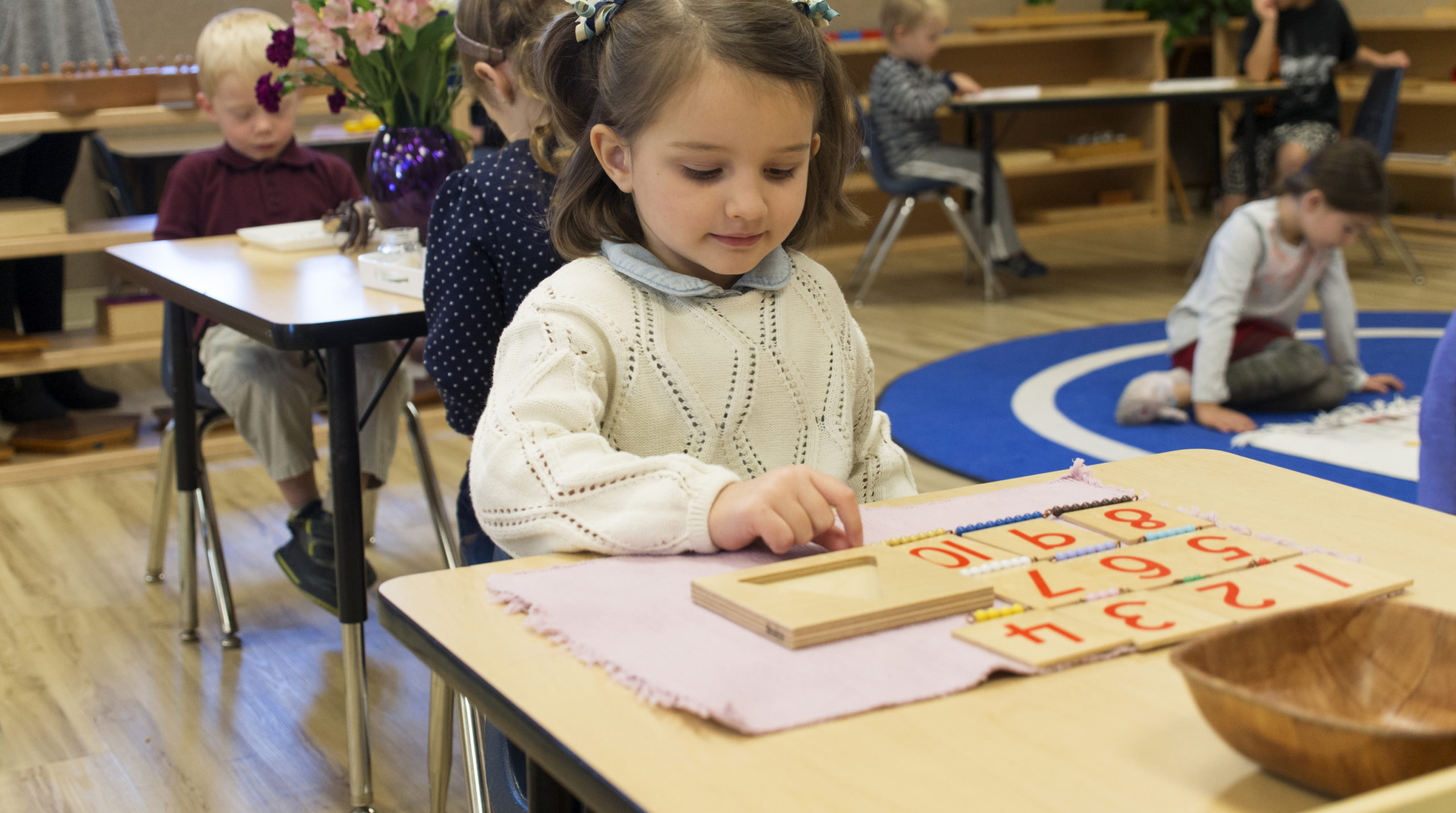
Engage your child in interactive learning experiences that involve hands-on exploration and discovery. In Montessori education, hands-on learning is highly valued as it allows children to actively engage with their environment, enhancing their understanding of concepts through direct experience.
Sensory exploration plays an important role in this process, as children learn through touch, sight, smell, taste, and hearing. By encouraging sensory exploration, you can help your child develop a deeper connection with the world around them.
Project-based learning is another key aspect of hands-on experiences in Montessori education. By working on projects that require planning, problem-solving, and creativity, children develop essential skills while actively participating in their own learning. These projects can range from building structures with blocks to creating art pieces with different materials.
Through these hands-on activities, children not only enhance their cognitive abilities but also foster a sense of accomplishment and independence.
Nurturing Creativity and Imagination
To foster creativity and imagination in your child, encourage open-ended play opportunities that spark curiosity and exploration. Art exploration and storytelling workshops can be fantastic avenues for nurturing your child’s creativity.
Engaging in activities where they can experiment with different art mediums, tell stories, and express themselves can help develop their imaginative skills.
Nature-inspired and open-ended play is also essential in fostering creativity. Encourage your child to spend time outdoors, exploring natural surroundings, and engaging in unstructured play.
Nature provides a rich environment for imaginative play, allowing children to connect with the world around them and spark their creativity.
Benefits of Montessori Education
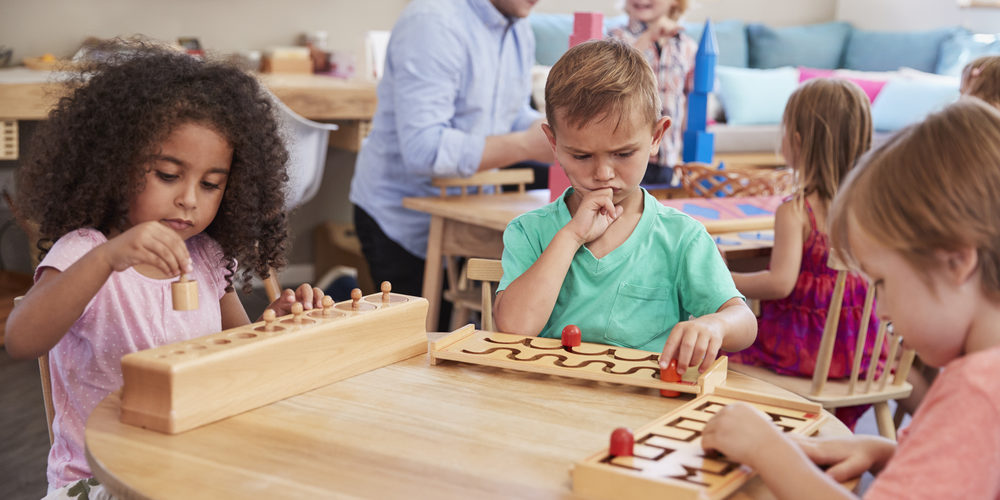
Exploring the benefits of Montessori education reveals a student-centered approach that emphasizes independence, hands-on learning, and individualized instruction. Montessori education is known for fostering academic success through its emphasis on personalized learning. By allowing students to explore subjects at their own pace and delve deeply into topics that interest them, Montessori schools cater to individual learning styles, leading to better academic outcomes.
Moreover, Montessori education promotes holistic development by focusing on the physical, emotional, social, and cognitive aspects of a child’s growth. This approach guarantees that children not only excel academically but also develop essential lifelong skills such as critical thinking, problem-solving, and effective communication.
Implementing Montessori Practices
When incorporating Montessori practices into your parenting approach, focus on fostering independence, hands-on learning, and personalized instruction to support your child’s holistic development.
Utilizing Montessori materials, such as the iconic pink tower or the spindle box, can aid in sensory exploration and cognitive development. Encourage child-led learning by allowing your little one to choose activities based on their interests, promoting a sense of autonomy and self-discovery.
Establishing Montessori routines within your household helps create a structured environment that fosters independence and responsibility. By involving your child in daily tasks like setting the table or tidying up their play area, you empower them to take ownership of their actions and contribute to the family unit.
Additionally, parent involvement in your child’s learning journey is vital. Engage in activities alongside your child, offer guidance when needed, and create a supportive atmosphere that encourages exploration and curiosity.
Frequently Asked Questions
How Can Montessori Education Support Children With Special Needs?
Montessori Education provides individualized support for children with special needs through sensory integration techniques. The inclusive community fosters a supportive environment, and adaptive tools are utilized to cater to each child’s unique learning style and needs.
Are There Any Specific Montessori Methods for Teaching Math Skills?
In Montessori education, specific methods for teaching math skills involve using Montessori manipulatives for hands-on learning. Children benefit from an individualized math curriculum that allows self-paced learning, fostering a deep understanding of mathematical concepts.
What Are Some Strategies for Successfully Transitioning to a Montessori School?
To shift successfully to a Montessori school, involve parents in understanding the school culture. Familiarize yourself with the classroom environment and guarantee curriculum alignment. Embrace the Montessori principles and support your child’s journey.
Can Montessori Principles Be Applied to Older Children or Teenagers?
Yes, Montessori principles can absolutely be applied to older children and teenagers. Montessori high schools focus on fostering adolescent independence, critical thinking, and self-directed learning, which are essential skills for their continued academic and personal growth.
How Do Montessori Schools Assess and Track Children’s Progress?
In Montessori schools, progress evaluation is holistic, focusing on individual growth. Assessment methods include observation, self-assessment, and informal assessments. Parent-teacher communication is key for regular progress updates, ensuring a collaborative approach to your child’s development.
Conclusion
To sum up, delving into Montessori education in your parenting journey can offer a unique and effective approach to nurturing independence, creativity, and a love for learning in your child.
By incorporating key principles and practices of the Montessori method into your home environment, you can create a supportive and enriching atmosphere that fosters growth and development.
Consider implementing Montessori techniques to enhance your child’s educational experience and encourage their natural curiosity and exploration.

Hey there! 👋 I’m a proud mom and passionate writer, sharing my parenting journey. 📝 Join me as I navigate the ups and downs of motherhood, offering tips, advice, and a sprinkle of humor along the way. 🌟

